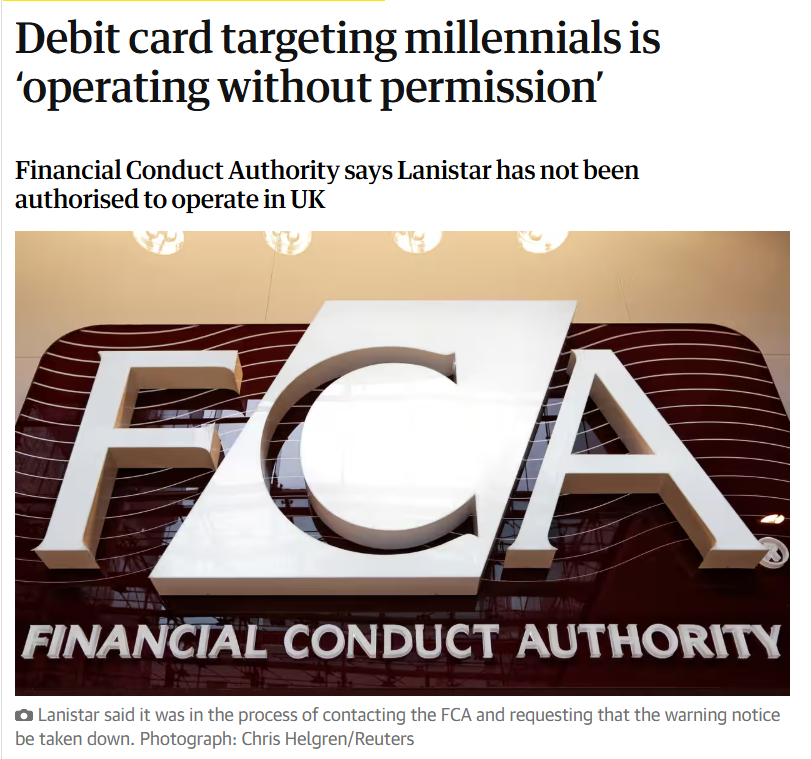Introduction
In a time when fintech innovation is booming, a new player named Lanistar has captured the attention of millions—particularly millennials and Gen Z consumers—through a glitzy influencer-driven marketing campaign. Billed as a next-generation debit card solution, Lanistar’s rapid rise on social media and promises of revolutionary banking services piqued curiosity. Yet beneath the glamor and viral endorsements lies a worrying reality: the firm has been publicly warned by the Financial Conduct Authority (FCA) for operating without authorization in the UK.
This article explores the story behind Lanistar’s launch, the regulatory red flags, and the broader implications for fintech startups and young consumers in an increasingly digital banking landscape.

The Hype Behind Lanistar’s Launch
Lanistar officially launched its app amid a wave of social media promotion in what can only be described as a textbook case of viral influencer marketing. Using bold colors, modern branding, and celebrity endorsements, the firm positioned itself as a must-have product for young consumers looking for smarter financial tools.
Some of the more high-profile influencers who promoted the brand include:
- Chris Hughes of Love Island
- Tommy Fury, professional boxer and reality star
- Demi Rose, Instagram model
- Georgina Rodriguez, model and partner of Cristiano Ronaldo
In total, Lanistar claimed to have recruited more than 3,000 social media influencers as part of a multi-million-pound marketing push. The campaign was successful in generating buzz across platforms like Instagram, Twitter, and TikTok, with thousands of users reposting or sharing promotional content. Its founder, Gurhan Kiziloz, openly declared his vision of turning Lanistar into a £1 billion “unicorn” fintech company within a year.
But the celebrations were short-lived.

The FCA’s Warning: A Harsh Dose of Reality
On the same week as Lanistar’s app launch, the Financial Conduct Authority (FCA) issued a public warning, stating that the company was not authorized to operate in the UK and may be offering financial services illegally. This warning appeared on the FCA’s official website, signaling serious regulatory concern.
The FCA’s statement included:
“We believe this firm has been providing financial services or products in the UK without our authorisation… This firm is not authorised by us and is targeting people in the UK. Based upon information we hold, we believe it is carrying on regulated activities which require authorisation.”
For a fintech company, FCA authorization is not merely a formality—it is a legal requirement. It ensures consumer protection, regulatory oversight, and compliance with financial laws. The lack of such authorization raises serious questions about Lanistar’s operational integrity, its back-end partnerships, and its actual ability to offer the services it claims.
Lanistar’s Defense: A Delicate Legal Dance
Lanistar responded quickly to the FCA’s warning, stating:
“Legal and regulatory compliance are central to Lanistar’s business, and we confirm that we are not providing financial services or products without the FCA’s authorisation.”
The firm claimed that it was not directly offering financial services but instead planning to partner with FCA-authorized firms in the future. Essentially, it argued that its launch was more of a marketing move than a rollout of live financial services. It added that it was in contact with the FCA to clarify the situation and was working to have the warning removed.
Yet for many, the damage had already been done. Public trust is fragile, and when it comes to financial institutions—especially ones asking users to trust them with sensitive information and money—reputation is everything.
What Exactly Is Lanistar Offering?
Lanistar positions itself as a “polymorphic debit card” platform. The premise is relatively novel:
Users can consolidate all their cards under one umbrella account.
Lanistar’s technology supposedly allows dynamic generation of security details (PINs, CVVs, etc.) to enhance security.
Users will be able to manage money through a visually appealing and intuitive mobile app.
The idea aligns well with a generation that expects sleek user interfaces and enhanced convenience. However, what distinguishes a novel concept from a viable financial product is regulatory backing—something Lanistar clearly lacked at the time of launch.
Fintech and Regulation: Why the FCA Matters
In the UK, nearly all companies offering financial services must be authorized by the FCA. This includes any business that provides:
Payment services
Credit arrangements
Investment advice
Insurance-related services
Issuing or managing debit cards
Authorization ensures that a firm meets rigorous standards on capital reserves, customer protection, anti-money laundering compliance, and data security. Operating without such approval doesn’t just raise legal concerns—it risks exposing consumers to fraud, identity theft, or loss of funds.
The FCA doesn’t typically name firms lightly. When it does, it signals that there may be a serious breach in compliance, or worse, a risk of scam-like activity.
Influencer Marketing in Fintech: Glamour vs. Trust
One of the most criticized aspects of Lanistar’s launch is its reliance on influencers rather than substance. While social media campaigns can be a powerful tool, in the case of financial services, overhyping a product without clarity or regulation can mislead consumers—especially younger audiences unfamiliar with financial risks.
In fact, regulators in several countries have raised concerns over “finfluencers”—influencers promoting financial products without understanding or disclosing the risks. In Lanistar’s case, many of the promotional posts lacked disclaimers or clarity on the fact that the company was not authorized or fully operational.
This kind of aggressive marketing can be compared to tactics used in crypto scams or high-risk investments, where influencers are paid to promote products they barely understand.
Lanistar’s Team and Corporate Structure
According to its official statements, Lanistar has:
- 400 employees across London, North Macedonia, and Athens
- Raised approximately £15 million in private funding
- Plans to roll out physical cards by January
Founder Gurhan Kiziloz describes himself as a visionary entrepreneur aiming to disrupt the traditional banking landscape. But despite the buzz and bold claims, little is publicly known about Lanistar’s financial structure, partner firms, or security protocols.
More transparency is urgently needed, especially if Lanistar intends to handle sensitive customer data and facilitate financial transactions.
Risk Factors for Consumers
If you’re a consumer thinking of signing up for services like Lanistar, here are some key risks to be aware of:
- Lack of FSCS Protection
Without FCA approval, users may not be protected under the Financial Services Compensation Scheme (FSCS), which safeguards deposits up to £85,000 in case a provider collapses. - Fraud Exposure
If the app collects card information but is not held to FCA-regulated security standards, your financial data may be at risk. - No Dispute Resolution
Authorized firms must offer dispute resolution mechanisms through the Financial Ombudsman Service. Unregulated firms do not. - False Advertising
Influencer promotions without disclaimers may create false impressions of legitimacy, leading users to sign up for products that do not yet exist.
Broader Implications: Is the Fintech Space Too Easy to Exploit?
Lanistar’s story is a cautionary tale for the fintech world. The combination of flashy marketing, ambiguous business models, and regulatory grey areas creates the perfect storm for consumer exploitation.
Startups often adopt a “move fast and break things” mentality, but this approach is dangerous when applied to finance. Regulation exists for a reason—and consumers need to demand that even the trendiest fintechs prove themselves worthy of trust.
As for Lanistar, until it secures full FCA authorization or a licensed partner agreement, its future remains uncertain. Its marketing push may win headlines, but trust is earned through transparency, regulation, and reliability—not just Instagram likes.
Conclusion
Lanistar’s high-profile launch paints a vivid picture of how modern fintechs are navigating the complex intersection of marketing, technology, and regulation. While the startup has managed to capture the imagination of a young, tech-savvy audience, its lack of regulatory approval has raised valid concerns that should not be dismissed.
In a world where financial apps are just a tap away, consumers must remain vigilant, and regulators must act swiftly to protect the public. Lanistar may yet fulfill its promises, but only if it learns to respect the rules of the game it claims to disrupt.







